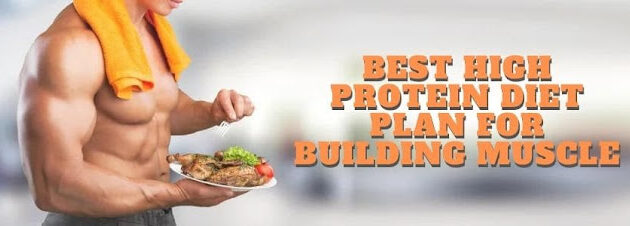Building muscle can be challenging but much more manageable with the right nutrition plan. A high protein diet is crucial for muscle growth, providing the body with the essential building blocks to repair and rebuild muscle tissue.
This article will discuss the best high protein diet plan for building muscle and how you can incorporate it into your lifestyle to achieve your fitness goals.
What is a High-Protein Diet?
A high-protein diet is a diet that emphasizes the consumption of protein-rich foods. A high-protein diet provides the body with enough protein to support muscle growth and repair.
A high-protein diet typically contains at least 1.6 grams of protein per kilogram of body weight, equivalent to roughly 0.7 grams per pound.
Why is Protein Important for Building Muscle?
Protein is an essential nutrient that plays a critical role in the growth and repair of muscle tissue. The amino acids in protein are used by the body to build new muscle fibers, and a sufficient protein intake helps ensure an adequate supply of amino acids for the body.
In addition, protein helps to promote muscle recovery after exercise, which is essential for muscle growth. Read also Best Home Workout Equipment for Weight Loss.
Best High-Protein Foods for Building Muscle
When building muscle, it’s important to focus on consuming high-quality protein sources that provide the body with all the essential amino acids it needs. Some of the best high-protein foods for building muscle include:
- Chicken breast
- Turkey breast
- Lean beef
- Fish (such as salmon and tuna)
- Eggs
- Dairy products (such as Greek yogurt and cottage cheese)
- Plant-based protein sources (such as tofu and tempeh)
How to Incorporate a High-Protein Diet into Your Lifestyle
Make a few simple changes to incorporate a high-protein diet into your lifestyle. Here are some tips to help you get started:
- Make protein a priority at each meal. Aim to consume at least 20-30 grams of protein per meal.
- Focus on consuming high-quality protein sources, such as those listed above.
- Incorporate plant-based protein sources into your diet if you are vegetarian or vegan.
- Consider using protein supplements, such as whey protein, to help you meet your protein needs.
- Remember also focuses on consuming a balanced diet with plenty of fruits, vegetables, whole grains, and healthy fats.
Conclusion
Building muscle requires a combination of exercise and nutrition, and a high-protein diet is critical to a successful muscle-building plan.
By incorporating high-quality protein sources into your diet and focusing on consuming at least 20-30 grams of protein with each meal, you can help to ensure that your body has the essential building blocks it needs to support muscle growth and repair.
Remember, a balanced diet with plenty of fruits, vegetables, whole grains, and healthy fats is also important for overall health and wellness.
FAQs
How much protein should I consume each day to build muscle?
A high-protein diet typically contains at least 1.6 grams of protein per kilogram of body weight, equivalent to roughly 0.7 grams per pound of body weight. Aim to consume at least 20-30 grams of protein per meal.
What are the benefits of following a high-protein diet for building muscle?
Benefits of following a high-protein diet for building muscle includes:
- Improved muscle growth and recovery.
- Increased muscle strength.
- Improved overall health and wellness.
Can I build muscle if I follow a vegetarian or vegan diet?
Yes, it is possible to build muscle if you follow a vegetarian or vegan diet. However, it may be more challenging to meet your protein needs, so it’s important to focus on consuming high-protein plant-based sources, such as tofu and tempeh, and consider using plant-based protein supplements.
Can I follow a high-protein diet if I have any medical conditions?
Before starting any new diet, it’s important to consult your doctor or a registered dietitian to ensure it is safe for you.


